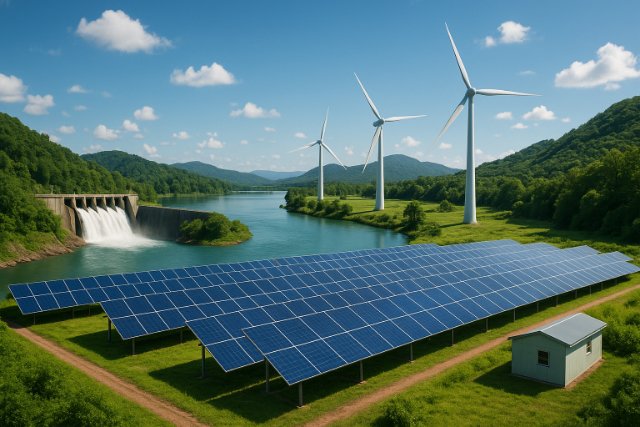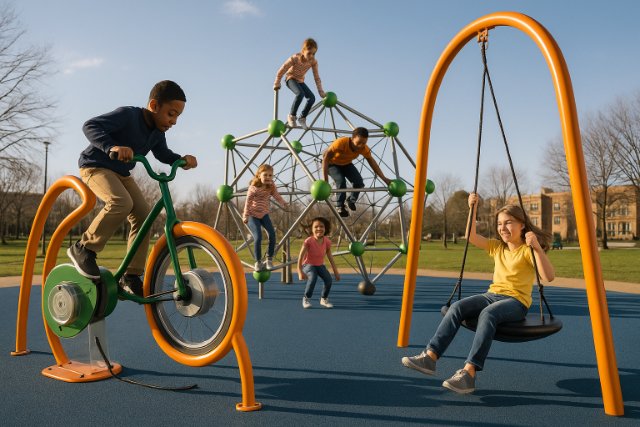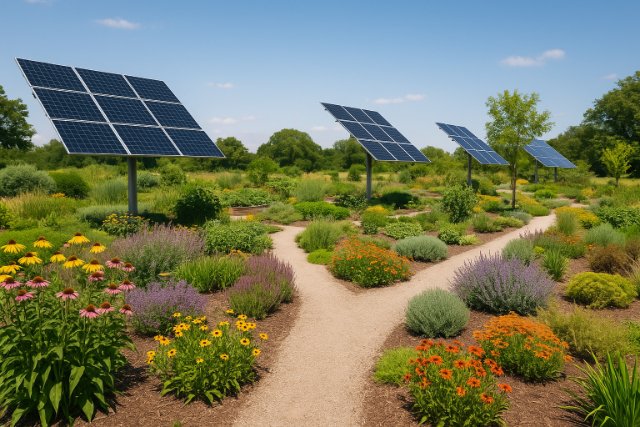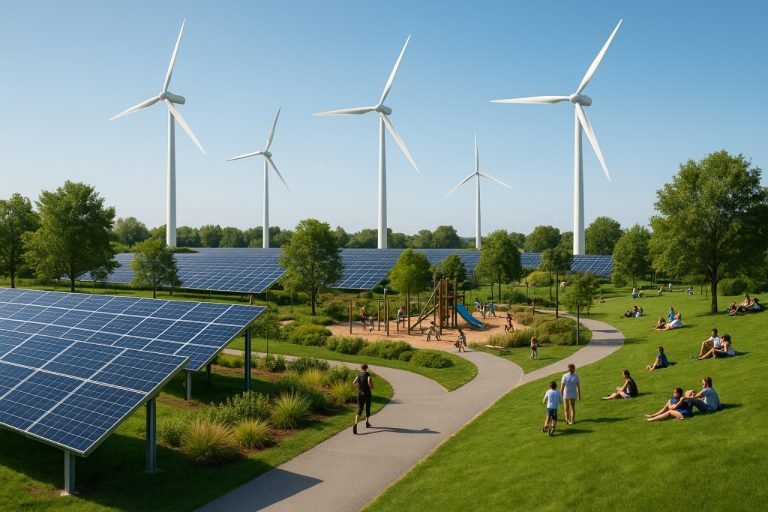Introduction
In an age where sustainability, health, and community well-being are top priorities, Energizer Park emerges as a revolutionary concept blending recreation, renewable energy, and environmental education into one vibrant ecosystem. This isn’t just a park it’s a living demonstration of clean energy in action, where every structure, pathway, and activity contributes to a sustainable future. Energizer Park represents a transformative space where people recharge their bodies, minds, and the planet simultaneously.
The park integrates solar power, wind energy, kinetic installations, and green architecture to create an energy-neutral recreational zone. Visitors can generate electricity through movement, witness real-time energy production, and learn how renewable systems can coexist with urban leisure. Beyond its technical innovations, Energizer Park redefines how communities interact with sustainability through play, education, and creativity
Design a Self-Sustaining Energy Ecosystem

The first step in understanding Energizer Park is recognizing how it sustains itself entirely through renewable energy generation. Unlike traditional parks that rely on municipal grids, Energizer Park produces its own electricity using integrated solar, wind, hydrokinetic, and piezoelectric systems.
Every light, digital display, and irrigation pump operates from energy generated within the park. This closed-loop system ensures that the park’s environmental footprint is minimal, demonstrating how self-sufficiency can be achieved even in public recreation spaces. The design prioritizes energy-positive operations, meaning it often produces more electricity than it consumes feeding excess energy back into local microgrids.
To achieve this, the park is divided into zones, each specializing in different forms of energy capture. Solar panels line the rooftops of pavilions and shelters, while vertical-axis wind turbines spin gracefully along pathways. Beneath footpaths, piezoelectric sensors convert the kinetic energy from footsteps into stored electrical power.
Small streams or water channels run through parts of the park, where micro-hydroturbines generate supplemental current. Together, these elements transform Energizer Park into a functional ecosystem of clean energy generation.
Harnessing Multiple Renewable Energy Sources
Energizer Park sustains itself entirely through renewable energy generation. Unlike traditional parks that rely on municipal grids, it produces electricity using solar, wind, hydrokinetic, and piezoelectric systems. Each energy stream works together to create a closed-loop, zero-emission environment.
Building Energy-Positive Zones
The park is divided into zones, each designed to maximize energy capture. Solar panels adorn rooftops, vertical wind turbines spin along paths, and piezoelectric sensors embedded in walkways convert footsteps into electricity. Micro-hydroturbines placed in streams generate additional current, ensuring every square meter contributes to energy production.
Energy System Overview Table
| Energy Source | Function | Integration Method | Output Contribution |
| Solar Panels | Capture sunlight for electricity | Rooftops, benches, canopies | 45% |
| Wind Turbines | Generate energy from airflow | Pathway edges, rooftops | 25% |
| Piezoelectric Floors | Convert footsteps to power | Walkways, plazas | 15% |
| Micro-Hydroturbines | Generate electricity from water flow | Streams, irrigation channels | 10% |
| Storage Units | Store excess energy | Underground hubs | 5% |
This hybrid energy network makes Energizer Park a model for carbon-neutral recreation.
Integrate Smart Infrastructure and Energy Data Systems
Energizer Park’s core innovation lies in its smart infrastructure a network of IoT-enabled sensors, data points, and monitoring systems that track real-time performance. Every section of the park communicates with a central energy management platform that balances production, usage, and storage seamlessly.
Digital dashboards installed throughout the park show visitors how much energy is being generated, stored, and consumed at any moment. This transforms every visitor into an active participant in sustainability awareness. The smart infrastructure also controls lighting intensity, water usage, and maintenance schedules through predictive algorithms to reduce waste and optimize efficiency.
Beyond functionality, the integration of smart systems also enhances user experience. Visitors can connect through a mobile app to view energy stats, find shaded zones, track air quality, or even locate the most energy-efficient walking paths. The result is a living, breathing smart environment that fuses recreation with environmental intelligence.
IoT-Enabled Energy Monitoring
Energizer Park’s smart infrastructure uses IoT sensors to track real-time energy data. Every solar panel, turbine, and pathway sensor communicates with a central energy management platform, optimizing generation and distribution dynamically.
Digital Dashboards and Mobile Applications
Interactive dashboards across the park display live metrics energy output, air quality, and visitor-generated power. Through the mobile app, users can locate shaded zones, access sustainability scores, and even monitor their personal energy contribution.
Predictive Efficiency Management
Smart algorithms regulate lighting, irrigation, and temperature control to minimize waste. Predictive analytics forecast maintenance needs, ensuring peak efficiency and lower operational costs.
By integrating technology with ecology, Energizer Park transforms into a living smart grid that both teaches and sustains.
Create Interactive Energy Zones for Public Engagement
The park’s most engaging feature is its interactive energy zones, designed to turn learning into a physical experience. Each zone encourages visitors to generate power, understand renewable systems, and experience energy transfer firsthand.
One of the most popular attractions is the Kinetic Playground, where swings, bicycles, and climbing structures are equipped with generators. Every movement powers LED art installations or charging stations nearby. Another area, the Solar Discovery Garden, features walkways embedded with transparent photovoltaic tiles that light up as visitors walk visually showing solar energy conversion.
Additionally, Energy Pods allow visitors to pedal stationary bikes or treadmills to generate electricity that powers sections of the park. Digital counters display real-time wattage production, giving participants tangible feedback on their contributions. The Wind Tunnel Exhibit invites users to control small-scale turbines and observe how blade design affects efficiency.
Each interactive component merges education, play, and environmental awareness, fostering a sense of personal empowerment. Visitors leave with a deeper understanding that every action, no matter how small, contributes to the global push for renewable energy.
Kinetic Playgrounds and Movement Energy

Interactive energy zones turn fun into function. The Kinetic Playground features bikes, swings, and climbing frames fitted with generators that light up nearby installations as users play.
Solar Discovery Gardens

The Solar Discovery Garden uses transparent photovoltaic tiles that glow as people walk, illustrating solar energy conversion in real time. These paths merge art, education, and sustainability.
Develop Green Architecture and Eco-Friendly Construction
Energizer Park’s design philosophy extends beyond energy generation it incorporates green building principles at every stage of construction. All structures use recycled or locally sourced materials, including reclaimed wood, compressed earth blocks, and recycled steel. The architecture emphasizes biophilic design, connecting people with nature through light, air, and vegetation.
Buildings are constructed using passive design strategies, reducing the need for mechanical heating or cooling. Roof gardens insulate structures while promoting biodiversity, and vertical green walls help purify the surrounding air. Even seating areas and playground structures are built using biodegradable composites or sustainably harvested timber.
Rainwater harvesting systems collect and purify water for irrigation, while natural filtration ponds support aquatic life and maintain ecosystem balance. The park’s pathways are made from permeable materials, allowing rainwater to seep through and replenish underground aquifers.
This integrated approach to design ensures that every square meter of Energizer Park contributes to environmental regeneration, embodying the philosophy that architecture should harmonize, not dominate, its surroundings.
Sustainable Building Materials
All park structures use recycled, renewable, or locally sourced materials, including reclaimed timber, recycled steel, and bamboo composites.
Passive Design and Natural Cooling
Buildings are designed for passive ventilation and daylight optimization, reducing energy needs. Roof gardens and green walls enhance air purification and thermal regulation.
Water Management and Permeable Pathways
Rainwater harvesting systems collect runoff for irrigation, while permeable pavements allow natural water infiltration, reducing flood risk.
This commitment to eco-architecture makes Energizer Park a benchmark for sustainable urban design.
Promote Wellness Through Renewable Fitness Programs
Energizer Park’s mission extends beyond sustainability it also promotes human wellness through energy-integrated fitness programs. The concept is simple: move your body, power the park, and feel energized in return.
The park hosts daily fitness activities such as group cycling, yoga-on-solar-decks, running circuits, and dance-powered energy events where participants generate electricity through motion-based equipment. These programs merge physical fitness with ecological purpose, creating a feedback loop of positive impact.
Advanced tracking systems measure how much clean energy is generated during group sessions, displaying totals on digital boards. Participants can even earn “Energizer Credits” redeemable for park amenities like healthy food, gear rentals, or discounts on community workshops.
By aligning health with sustainability, Energizer Park transforms exercise into a collective contribution to clean energy awareness. This energy-for-health model redefines how recreation and sustainability can coexist symbiotically.
Energy-Generating Exercise Equipment
Fitness stations and cycling hubs are connected to generators that power parts of the park. Each workout session becomes an act of environmental contribution.
Community Health and Energy Events
Group cycling, yoga sessions, and dance-powered events fuse physical wellness with clean energy production. Participants track energy output collectively through digital displays.
Reward-Based Sustainability Programs
Through “Energizer Credits,” participants earn rewards for energy generation, redeemable for local organic food or workshop access.
This synergy between movement and sustainability redefines exercise as eco-positive fitness.
Educate Visitors Through Environmental Learning Centers
At the heart of Energizer Park lies its Environmental Learning Center, an educational hub designed for schools, families, and eco-enthusiasts. Here, interactive exhibits and guided workshops explain renewable technologies, climate change solutions, and sustainable living practices.
Students can explore miniature models of solar grids, simulate wind turbine operations, or engage in sustainability challenges that encourage problem-solving. The center also offers certification programs in renewable energy literacy, making it a valuable resource for both education and community empowerment.
Workshops cover diverse topics from composting and urban gardening to designing personal solar devices. Educational tours highlight real-time data from the park’s operational systems, bridging the gap between theory and practice.
By transforming complex environmental concepts into tactile experiences, the Learning Center nurtures a generation of eco-conscious citizens ready to take sustainable action beyond the park’s borders.
Renewable Energy Education Hubs
The Environmental Learning Center offers interactive exhibitions on solar, wind, and kinetic technologies. Visitors can experiment with model grids or simulate energy systems.
Hands-On Sustainability Workshops
Workshops teach composting, urban farming, recycling, and green tech innovation. Students learn practical methods to reduce waste and conserve resources.
School and Community Partnerships
Educational programs partner with schools and universities to promote environmental literacy. The center acts as a community catalyst for eco-education.
Through immersive learning, Energizer Park builds an eco-aware generation of citizens.
Foster Biodiversity Through Ecozones and Native Plant Restoration
Sustainability isn’t limited to energy it also extends to biodiversity conservation. Energizer Park dedicates large portions of its landscape to ecozones that restore native habitats and support pollinator species.
These ecozones include butterfly gardens, bird sanctuaries, and bee habitats managed under ecological supervision. Native trees and shrubs are carefully planted to enhance soil quality, sequester carbon, and reduce irrigation demands. Seasonal planting schedules ensure that flora blooms year-round, providing consistent nourishment for pollinators.
The biodiversity initiative is also integrated into the park’s educational mission. Information panels and AR-guided tours teach visitors about local ecosystems, species importance, and conservation methods. The result is a living classroom where nature thrives alongside human innovation.
By emphasizing biodiversity as an energy partner, Energizer Park demonstrates that ecological balance is a vital part of sustainable design.
Native Species Conservation
The park’s ecozones restore habitats for native trees, birds, and pollinators, improving biodiversity and soil health.
Pollinator and Bird Sanctuaries
Dedicated areas house bee colonies and butterfly gardens to support pollination and ecological stability.
Ecological Learning and Guided Tours
AR-guided tours explain plant functions, wildlife habits, and conservation benefits. Educational boards make the ecosystem accessible to all.
Energizer Park proves that technology and ecology can flourish side by side.
Build Community Through Events and Collaborative Programs
Energizer Park functions as a community catalyst, bringing people together through sustainability-driven events. Its open plazas and amphitheaters host green festivals, renewable tech expos, farmers’ markets, and eco-cinema nights powered entirely by park-generated energy.
Workshops, youth programs, and volunteer initiatives encourage local involvement in environmental upkeep. The park’s “Adopt-a-Tree” and “Energy Ambassador” programs let individuals or organizations contribute to ongoing sustainability efforts. These collaborations cultivate a strong sense of community ownership, turning the park into a shared symbol of environmental progress.
Beyond recreation, Energizer Park acts as a hub for green innovation startups, offering co-working pods powered by renewables. Entrepreneurs and researchers can test small-scale renewable prototypes within the park environment bridging creativity and practicality.
By merging environmental consciousness with social connectivity, Energizer Park becomes more than a location it becomes a movement for sustainable living.
Sustainability-Focused Events
The park hosts renewable expos, eco-festivals, and open-air cinema nights powered entirely by clean energy.
Volunteer and Ambassador Programs
Visitors can join initiatives like “Adopt-a-Tree” or “Energy Ambassador,” contributing directly to park upkeep.
Innovation Hubs and Co-Working Spaces
Renewable energy startups use co-working pods within the park to prototype green technologies.
These collaborative spaces transform Energizer Park into a living incubator for sustainability.
Support Sustainable Food Systems and Urban Agriculture
Food plays a crucial role in sustainability, and Energizer Park embraces this through urban agriculture zones and eco-friendly cafés. These areas produce fresh, organic produce using hydroponics, aquaponics, and vertical farming systems powered by renewable energy.
Visitors can participate in hands-on gardening workshops or harvest produce during seasonal events. The harvested food supplies the park’s own eateries, creating a farm-to-table cycle within the same space. The cafés use biodegradable packaging and solar-powered cooking systems, aligning culinary operations with the park’s green ethos.
The agricultural section also acts as a research site where local universities and sustainability organizations experiment with energy-efficient food production methods. These innovations showcase how cities can adopt closed-loop food-energy-water systems to promote self-sufficiency.
By integrating agriculture into recreation, Energizer Park reinforces the message that sustainable food production is central to a balanced and resilient future.
Energy-Powered Urban Farming
Hydroponic and aquaponic systems grow organic produce using renewable power sources, creating self-sufficiency in food supply.
Farm-to-Table Operations
On-site cafés use freshly harvested produce and solar cooking systems, ensuring minimal carbon impact.
Community Agricultural Education
Workshops teach visitors how to grow their own food sustainably. Seasonal harvest festivals celebrate local, low-impact cuisine.
By merging agriculture and clean energy, Energizer Park nourishes both people and the planet.
Leverage Art and Culture to Inspire Environmental Action
Art is a powerful tool for communication, and Energizer Park integrates it deeply into its landscape. Renewable art installations, light sculptures, and energy-reactive murals create an emotional connection between creativity and sustainability.
Artists collaborate with engineers to design pieces that visually represent renewable energy processes. For instance, kinetic sculptures powered by wind or human motion move gracefully across the park, symbolizing harmony between art and technology. Nighttime brings the park to life as solar-powered light shows illuminate pathways and trees, turning energy into art.
Cultural programs such as eco-music festivals, interactive theater, and storytelling events reinforce environmental themes. By merging artistic expression with renewable technology, Energizer Park transforms sustainability from a concept into a cultural experience that resonates across generations.
Energy-Driven Art Installations
Kinetic sculptures and solar-powered light displays illustrate the beauty of renewable energy.
Cultural Festivals and Eco-Theater
Performances, music, and art exhibitions integrate sustainability themes, sparking emotional engagement with the environment.
Creative Collaboration Between Artists and Engineers
Artists partner with scientists to design energy-reactive murals and installations powered by movement or wind.
Through art, Energizer Park transforms sustainability into a cultural narrative of hope and renewal.
Ensure Long-Term Sustainability Through Maintenance and Innovation
A park of this complexity requires a dynamic strategy for long-term sustainability. Energizer Park’s maintenance model uses predictive analytics and modular infrastructure to ensure continuous efficiency.
Sensors monitor the health of solar panels, turbines, and vegetation. AI-driven systems predict when components require cleaning, replacement, or optimization, minimizing resource waste. Water and energy cycles are automatically balanced to maintain peak operational performance.
Furthermore, Energizer Park maintains a Sustainability Innovation Lab, where engineers and designers collaborate to test next-generation renewable technologies. Each improvement is applied to the park’s existing system, ensuring that it evolves with advancing science.
Through adaptive management, the park remains a living organism continuously learning, upgrading, and inspiring sustainable progress.
Predictive Maintenance Systems
Sensors detect equipment performance and predict servicing needs, minimizing downtime and waste.
Adaptive Infrastructure Evolution
The Sustainability Innovation Lab tests new materials and technologies, integrating them into park operations.
Circular Resource Management
Every system from water to energy follows a closed-loop model, reducing dependency on external grids.
This forward-thinking approach ensures Energizer Park remains a perpetually evolving green model.
Table: Core Features of Energizer Park
| Category | Core Element | Purpose | Example Implementation |
| Energy Systems | Solar, Wind, Kinetic | Power generation | Solar benches, piezo paths |
| Education | Learning Center | Environmental literacy | Renewable workshops |
| Fitness | Energy-integrated exercise | Promote wellness | Pedal-powered gyms |
| Biodiversity | Ecozones | Support native species | Pollinator gardens |
| Food | Urban farming | Local food production | Hydroponic towers |
| Art & Culture | Renewable art | Inspire awareness | Kinetic installations |
| Technology | Smart IoT systems | Efficiency & monitoring | Energy dashboards |
Conclusion
Energizer Park stands as a beacon of what’s possible when technology, nature, and community converge toward sustainability. It’s more than a park it’s a prototype for the eco-cities of tomorrow.
By combining renewable energy, smart data systems, and eco-friendly design, Energizer Park transforms everyday recreation into environmental regeneration. It invites every visitor to participate in the energy cycle powering the park through motion, awareness, and creativity.
Ultimately, Energizer Park represents a future where people don’t just enjoy nature they energize it.
Explore more insightful and valuable content on our blog VeoTag.com! Stay updated with helpful tips, expert advice, and in-depth articles that enhance your knowledge.
Related Articles:
Solar Solutions in Melbourne: Harnessing the Sun’s Power
4 Reasons Why a 5kW Solar System is a Must for Your Home
Important Questions to Ask a Flat Roof Solar Panels Installer Before Hiring
FAQ’s
To create a self-sustaining recreational environment powered entirely by renewable energy while fostering environmental education and wellness.
It uses solar panels, wind turbines, kinetic flooring, and water turbines to create a self-sufficient, net-positive power system.
Yes. Visitors power installations through movement cycling, walking, or playing in kinetic zones that produce real electricity.
It integrates green architecture, renewable power, recycled materials, smart water systems, and biodiversity-friendly landscaping.
Workshops, volunteer programs, and sustainability festivals engage the public in hands-on environmental action.
Absolutely. Its modular blueprint can be adapted to cities worldwide, promoting renewable-powered recreation and urban resilience.

